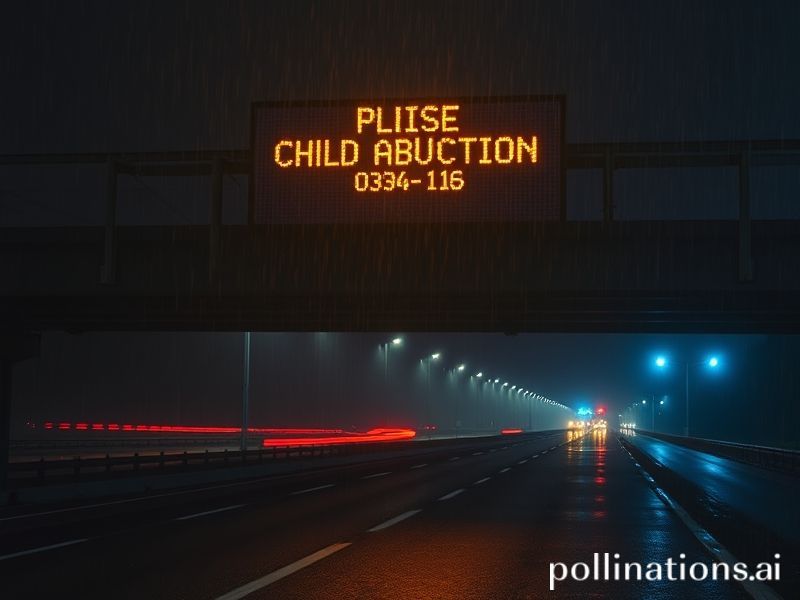Global Panic Button: How Amber Alerts Became Humanity’s Universal Scream for Missing Children
**The Global Scream: How a Child’s Abduction Became the World’s Emergency Ringtone**
The amber alert has evolved from a humble American emergency system into humanity’s collective panic button—a digital air raid siren that transforms every smartphone into a handheld megaphone of dread. What began as a tribute to a murdered nine-year-old in Texas has metastasized into a global phenomenon, proving that nothing unites humanity quite like our shared terror of losing our offspring to the darkest corners of society.
From Toronto to Tokyo, São Paulo to Stockholm, nations have eagerly adopted this American export with the enthusiasm of teenagers discovering a new social media platform. The European Union, never one to miss an opportunity for bureaucratic expansion, has crafted its own version called the “Child Alert,” because apparently “amber” doesn’t translate well into 24 official languages. Meanwhile, Mexico’s “Alerta Amber” operates with particular urgency—understandable in a country where drug cartels have turned kidnapping into a cottage industry with the efficiency of Amazon Prime.
The system’s international rollout reveals our species’ charming optimism: we genuinely believe that alerting millions of people about an abduction will somehow help, rather than simply providing millions of people with fresh nightmare fuel. Canada implemented its system in 2002, because nothing says “friendly neighbor” quite like adopting another country’s trauma response. Australia followed suit, because if there’s one thing Australians understand, it’s dangerous things that want to hurt you.
But here’s where the plot thickens like a good noir: these alerts have become victims of their own success. In our hyperconnected world, the amber alert has achieved the impossible—it’s made abduction boring. New Yorkers sleep through them like lullabies. Californians swipe them away with the same enthusiasm they reserve for dating app notifications. We’ve created a society where the kidnapping of a child competes for attention with TikTok dances and celebrity breakups, and spoiler alert: the missing child usually loses.
The international implications are deliciously ironic. While Western nations debate whether 3 AM alerts are “too disruptive” (imagine the horror of losing sleep over someone else’s missing child), developing nations struggle with the basic infrastructure needed to scream “help” digitally. Uganda’s police force would love to send instant alerts, but they’re still working on reliable electricity. Syria’s alerts would need to compete with air raid sirens—a grim reminder that in some neighborhoods, childhood itself is an endangered concept.
Perhaps most telling is how these systems reveal our technological tribalism. Japan’s alerts arrive with characteristic politeness, apologizing for the interruption. France’s alerts come with philosophical undertones about society’s collective responsibility. America’s alerts scream with the subtlety of a blockbuster movie trailer, complete with capital letters and exclamation points—because if we’re going to terrify parents, we might as well do it with gusto.
The amber alert has become our generation’s town crier, except instead of “hear ye, hear ye,” it’s “BEEP BEEP BEEP—another reminder that the world eats the innocent for breakfast.” We’ve created a global network that can locate a missing child faster than a pizza delivery, yet somehow children keep disappearing. It’s almost as if technology can’t solve systemic problems—shocking, I know.
As we march forward into this brave new world of interconnected anxiety, one thing remains certain: the amber alert will continue evolving. Tomorrow’s version will probably interrupt your virtual reality meditation session to inform you that somewhere, somehow, another piece of innocence has been stolen. And we’ll all pause, sigh, and return to our regularly scheduled programming—because what else can we do in a world where even our phones have become unwilling participants in humanity’s oldest tragedy?
The alert screams. We scroll on. The circle of modern life continues, now with push notifications.







